STOP IN THE NAME OF LOVE
STOP IN THE NAME OF LOVE
what music is singing at Russia
by Norman Warwick
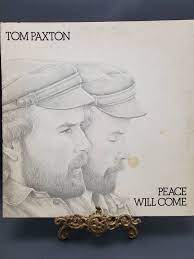
It is half a century ago that Tom Paxton recorded the simplest of songs. Peace Will Come simply stated a man´s belief that one its titular declaration would come. So its been fifty years right down the line and the world ain´t got straight in none of that time, and the current dreadful situation in Ukraine is casting a large shadow once more over Tom´s simple faith.
No one knows for sure when Moscow will end the slaughter. It seems that that every day that passes plays against Putin’s interests. The increasing aggression in the attacks shown by his Russian army in recent days is wreaking the destruction of hundreds of buildings and infrastructures in the main cities of Ukraine, several of which are already under Moscow control, It is all seeking to force the surrender of the Ukrainian people.
The military scale has rapidly increased dangerously with the Russian bombing of some of the facilities of the Zaporizhia nuclear power plant, in the town of Energodar, in south eastern Ukraine, the largest in Europe, where three buildings burned. Luckily, it did not affect the central building but the nuclear power plant is already under the Russian flag.
Already more than a million Ukrainians, women, children and the elderly have left the country in the largest modern exodus produced in less time in Europe.
Many of us will know someone involved in this carnage.
As a ´new resident´ on Lanzarote,. having retired here from the UK seven years ago I am perhaps more cocooned from the vicissitudes of the real world than I was in in England. And yet, in some way I am perhaps more aware of that real world, over here. Lanzarote is a global village with tourists visiting from all around the globe and a rising number of new residents re-patriating here from an ever widening list of countries

Sadly, then, we are not surprised to learn that the dreadful events in Ukraine impact directly even on inhabitants here on the island. We saw a wonderful classical music concert a couple of years ago performed by a duo playing violin and piano, and subsequently interviewed the violinist. Iya Zchmaeva who spoke a little English.

We have followed news of both artists ever since and have learned that the Ukrainian pianist, Natalia Nicolayeva, who has played in Lanzarote, within the concert cycle of the Nino Díaz Foundation, shares the mixed feeling that a large part of the Ukrainian people live with during this painful conflict.
“I grew up in Crimea but I also had a Ukrainian passport and now my heart is divided, my friends and family are Ukrainians and Russians, too. It’s a disaster,” she says.
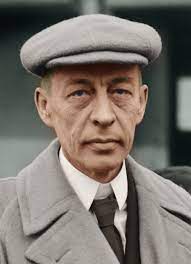
Born on the Crimean peninsula, she lives in Berlin and Lanzarote. She began her studies in piano and music pedagogy in Simferopol (Crimea) and Lviv (Ukraine), which she continued at the University of the Arts (UdK) in Berlin. During her studies she took part in various advanced piano and chamber music courses. She taught piano at the University of Potsdam, where she also obtained a doctorate on the works of the composer Sergej Rachmaninov (right) . Natalia has published several articles in music publications. She has had an intense concert activity as a solo pianist as well as in collaboration with orchestras and chamber ensembles. The pianist has given concerts in the past in Germany, Ukraine, Russia, Poland, Belgium, France, Sweden, the Netherlands and Latin America. In Spain, especially in the Canary Islands, her educational and concert projects, such as “La Pasión de Viajar”, “Espérame”, “Proyecto Humboldt”, “Muraría de Lanzarote”, among others, are regularly presented.
Natalia is now back in Berlin organizing a series of concerts to raise funds for victims of the war in the Ukraine.
She told Lancelot Digital of her fears and determination but even as we read of her own concerns we were watching tv news of agreed ´escape routes´ being fired on and seeing desperate mothers with babes in arms, running through and dodging shells and bombs.
I mean it is a compliment when I say that that, apart from her incredible playing, the woman we met at that concert seemed a perfectly ordinary lady, content with her music. Now she is caught up in a conflict being watched in horror around the world, and is doing something extraordinary to help the suffering.
That Natalia is doing so through her music doesn´t surprise us, because we are aware of how effective music, poetry and other art forms can be, through protest and satire, in raising awareness of the kind of evils being perpetrated by Russia at the moment,.

How quickly artists galvanise themselves in troubled times is evidence not only by Natalia´s instant determination to ´do something´ but also by release of a new poem by British poet-laureate Simon Armitage (left) .
The writer told The Guardian earlier this week that he calls his piece a ‘refracted version of what is coming at us in obscene images through the news’.
The poet laureate has written his poem about the invasion of Ukraine and the pain of displacement, as a mark of solidarity with those under fire.
The work was written, and titled Resistance, over a few days against a backdrop of harrowing television footage of Ukrainians fleeing bombardment and shooting.
Armitage, who was appointed poet laureate in 2019, said: “This is a public role and there are times when I need to respond publicly. The first time that happened was at the beginning of the pandemic. That was one of the most important events in my life, and I felt a responsibility and duty to write something.
“Then this great big mess came along, and I feel the same way. My head is full of images and language and ideas, and it’s almost a relief to set things down on paper.”
The poem was a “refracted version of what is coming at us in obscene images through the news”. Reports from Ukraine were both compelling and difficult to watch, he said. “I definitely can’t sit through both the 6pm and 10pm news bulletins.”
The poem repeats the words “it’s war again” several times, in reference to successive conflicts in recent history. “There’s a weariness in the poem; here we go again,” said Armitage.
“But [the poem] is also a form of resistance, I hope. There’s not a lot I can do, sitting here. But writing it down, taking ownership of the terrible images, feels a positive act.”
Poetry had an “unbroken relationship with conflict and war, going right back to the Iliad”, said Armitage. He pointed to the famous generation of first world war poets – “the bloggers of their day” – and to Tony Harrison’s poems about more recent wars in the Gulf and Bosnia.
While evoking the desperate urgency of escaping death and destruction, Armitage’s poem ends on a note of hope: “An air-raid siren can’t fully mute the cathedral bells.”
It was not clear yet whether the world was at a truly pivotal moment, he said.
“I was talking to somebody the other day who’d been a young man at the height of the cold war and the Bay of Pigs crisis, and he said he used to go to bed not knowing whether he’d wake up in the morning.
“I don’t think we’re quite there yet. But in terms of catastrophe, tragedy, this feels as real and raw as anything I can remember. And the stakes are very high.”
As the world watches (and perhaps does little else) there is small wonder then, that what was once seen as one the lightweight throwaway songs by The Beatles, Back In The USSR, has been als been recently re-examined by the music media.
More than 50 years ago now, as the Cold War was ever at risk of turning nuclearly hot, The Beatles released one of their more controversial songs: “Back in the USSR.”
It is instructive to look back and see what inspired the Beatles to write the song and what the lyrics tell us about its original meaning and the global perception of the USSR at the time.

There were some fans at the time who thought The Beatles making some kind of a pro-Soviet political statement, whilst others more tolerantly felt the group was just poking innocent fun at the western idealism expressed by the prevailing culture and their musical peers at the time. However, perhaps the emergence of the Russian head of state as a clear villain on the world stage casts a different hue on Back in the USSR. imposing on it a different meaning.
American Songwriter have published a behind the song segment about Back in The USSR..
Talk about an international conception—Paul McCartney and John Lennon wrote the lyrics to the titularly Russian song in India, to riff off Chuck Berry’s pro-America song “Back in the USA,” after being originally inspired by Britain’s industrially provincial “I’m Backing Britain” campaign.
To escape fame and learn transcendental meditation in 1968, the band travelled to Rishikesh, a trip that was uniquely productive for McCartney in particular, who later claimed to have penned fifteen songs during his five-week stay.
One of those songs was Back In The USSR, which comes from the perspective of a Russian spy, who after an extended stay in America, returns home to the Soviet Union and indulges in those most Russian of pleasantries: the icily beautiful landscape, and the warmth and favors of Russian women.
Oh, show me ’round your snow-peaked mountains way down south
Take me to your daddy’s farm
Let me hear your balalaikas ringing out
Come and keep your comrade warm
And
Been away so long, I hardly knew the place
Gee, it’s good to be back home
Leave it till tomorrow to unpack my case
Honey, disconnect the phone
Those lyrics are a spoof on how Americans often miss their conveniences while traveling out of the country, craving things like fast food and a Howard Johnson hotel. McCartney wondered, what would happen if a Russian spy thought the same after being away from his own country?
Oh, let me tell you, honey
Hey, I’m back
I’m back In the U.S.S.R. (Woo, ooh, ooh)
Hey, it’s so good to be home (Woo, ooh, ooh)
Yeah, back In the U.S.S.R.
Back in the USSR peaked at just No. 19 on the UK Single Chart, a modest ranking relative to some of the Beatles’ other galactically popular songs. And later, Rolling Stone would slot it in as only the 85th best of the Beatles songs.
Critical response was mixed as well. While some saw it as screaming with excitement and ingenious, others saw it as half-hearted and limp.
But the strongest rebuke of the track came from the political sphere, where many across the left-right spectrum accused it as being sympathetic to socialism, and further evidence of the Beatles’ pro-soviet sentiment.
While many of those critiques are drably serious for what is obviously a sarcastic song, it can not be disputed that the song struck a certain chord.
As the monstrosities of Vietnam were increasingly televised, the public’s belief in the notion of American exceptionalism began to wane for the first time. In search of a geopolitical alternative, it was natural that the culture’s gaze fix upon the Soviet Union, a perfect foil to the west.
That is why “Back in the USSR” elicited such strong reactions back then.
Obviously, the title of the track has now been made provocative as the Russian head of state embraces expansionism, and literally attempts to return Russian borders back to something resembling what they were in the time of the USSR.
But outside of that, current events do little to change the meaning of the song. The song was not pro-Soviet. And there really is no nuanced political meaning woven into the lyrics.
Oftentimes the songs we perceive as being rich with complexity started off as little more than a musician’s desire to experiment and do something different.
That was the case when the Eagles wrote the hazy lyrics to “Hotel California,” when Don McLean wrote the broadly allegorical “American Pie,” and when the Beatles wrote the provocative, if only at surface level, lyrics to Back to the USSR.

In the UK, the Royal Opera House has cancelled a summer season from the Bolshoi Ballet, on Friday the Helix theatre in Dublin cancelled a performance of Swan Lake by the Royal Moscow Ballet (left) , and the Bristol Hippodrome, the Edinburgh Playhouse, the Wolverhampton Grand Theatre, the New Theatre Peterborough, and the Royal and Derngate in Northampton have all cancelled tour performances from the Russian State Ballet of Siberia.
Vladimir Urin, the director of the Bolshoi Ballet, was appointed by Russian President Vladimir Putin’s government in 2013, and the Russian State Ballet is a state-sponsored company.
The Royal Moscow Ballet however, said in a statement after its performance in Dublin was cancelled, that the ballet company is in “no way funded or sponsored by the Russian government”.
The company has been touring Ireland annually for over 10 years, and the dancers represent various nationalities; the Russian, Ukrainian, Belarusian, Uzbek, Japanese, Irish and Polish cast and crew have travelled the world with each other for a number of years.
The statement continued: “We hope this helps to clarify the diversity of our ballet company and that we don’t carry any political message on this tour. We simply dance for peace.”
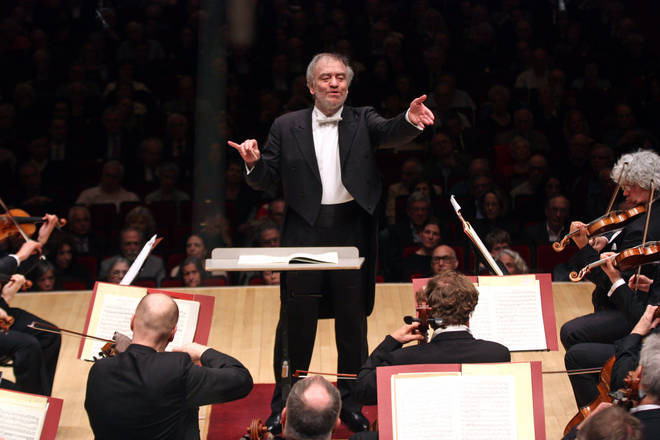
In the United States, New York’s Carnegie Hall was set to host the Vienna Philharmonic conducted by Russian music director, Valery Gergiev, (right) with the piano soloist, Denis Matsuev, last week.
Both musicians, who have strong ties with Putin, were removed from the weekend programme and replaced with Canadian conductor, Yannick Nézet-Séguin and South-Korean pianist, Seong-Jin Cho, after multiple public protests ahead of the planned concerts.
Carnegie Hall has also cancelled two upcoming performances where Gergiev would have led the Mariinsky Orchestra in May. And on Sunday, Gergiev’s European manager, Marcus Felsner, announced that he would be dropping his Russian client due to the 68-year-old conductor’s ties to Putin.
In a statement, Felsner said: “In the light of the criminal war waged by the Russian regime against the democratic and independent nation of Ukraine, and against the European open society as a whole, it has become impossible for us, and clearly unwelcome, to defend the interests of Maestro Gergiev.
“This is the saddest day of my professional life.”
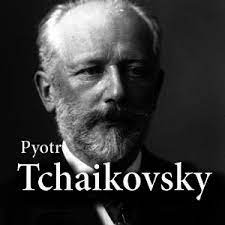
Meanwhile, The Cardiff Philharmonic Orchestra has removed Tchaikovsky (left) from its programme of its upcoming concert ‘in light of the recent Russian invasion’.
Tchaikovsky’s 1812 Overture was due to be included in the orchestra’s upcoming all-Tchaikovsky concert at St David’s Hall on 18 March, but it was considered by the orchestra ‘to be inappropriate at this time’.
The 1812 Overture was written to commemorate the successful Russian defence against Napoleon’s invasion in 1812, featuring cannon fire, chimes and a brass fanfare. The piece was due to be performed alongside another militaristic work by Tchaikovsky: his 1876 Marche slave, written to celebrate Russia’s involvement in the Serbian-Ottoman War. The composer’s Second Symphony was the final piece in the programme.
The orchestra will instead present a programme centred around Dvořák’s Symphony No. 8, with John Williams‘s The Cowboys Overture opening the concert, and a performance of Elgar‘s Enigma Variations in the second half.
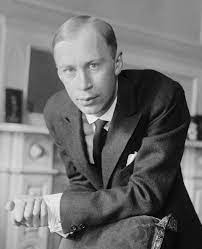
Martin May, the orchestra’s director, has since shared a statement to explain the context behind the decision. ‘The decision on this concert was very much based on here and now. A member of the orchestra has family directly involved in the Ukraine situation and we are trying to respect that situation during the immediate term. There were also two military themed pieces as part of the programme (Marche Slave and 1812) that we felt were particularly inappropriate at this time. We were also made aware at the time that the title ‘Little Russian’ of Symphony No. 2 was deemed offensive to Ukrainians.
‘Whilst there are no plans to repeat the Tchaikovsky concert at the moment, we have no plans to change our summer and autumn programmes which contain pieces by Rachmaninov, Prokofiev (left) and Rimsky-Korsakov. So, in summary, this is a one-off decision made with the best of intentions and there is no intention to exclude Tchaikovsky in particular. He is one of my favourite composers. We are aware that, whatever decision we made, it would not go down well, so we are stuck between a rock and a hard place.’
We desperately hope the world will find a way to bring an end to this carnage, and that one day soon, Natalia will be back here on Lanzarote contributing so much to this island with her music. Nevertheless news of such actions taken elsewhere in the world might make her feel slightly less alone and better supported in her fund raising musical activities. It is right, in the view of Sidetracks And Detours, to delete from playlists any music that might be interpreted, mistakenly or otherwise, to be glorifying Russia´s current abominations. but we do need to keep watching the detectives !! Who monitors the monitors?

The primary source for this article was extrapolated from a piece, to which i was alerted by reader Marlene Bewick published in The Guardian, a reliable supplier of overviews.
In our occasional re-postings Sidetracks And Detours are confident that we are not only sharing with our readers excellent articles written by experts but are also pointing to informed and informative sites readers will re-visit time and again. Of course, we feel sure our readers will also return to our daily not-for-profit blog knowing that we seek to provide core original material whilst sometimes spotlighting the best pieces from elsewhere, as we engage with genres and practitioners along all the sidetracks & detours we take.
This article was collated by Norman Warwick, a weekly columnist with Lanzarote Information and owner and editor of this daily blog at Sidetracks And Detours.
Norman has also been a long serving broadcaster, co-presenting the weekly all across the arts programme on Crescent Community Radio for many years with Steve Bewick, and his own show on Sherwood Community Radio. He has been a regular guest on BBC Radio Manchester, BBC Radio Lancashire, BBC Radio Merseyside and BBC Radio Four.
As a published author and poet Norman was a founder member of Lendanear Music, with Colin Lever and Just Poets with Pam McKee, Touchstones Creative Writing Group (for which he was creative writing facilitator for a number of years) with Val Chadwick and all across the arts with Robin Parker.
From Monday to Friday, you will find a daily post here at Sidetracks And Detours and, should you be looking for good reading, over the weekend you can visit our massive but easy to navigate archives of over 500 articles.

e mail logo The purpose of this daily not-for-profit blog is to deliver news, previews, interviews and reviews from all across the arts to die-hard fans and non- traditional audiences around the world. We are therefore always delighted to receive your own articles here at Sidetracks And Detours. So if you have a favourite artist, event, or venue that you would like to tell us more about just drop a Word document attachment to me at normanwarwick55@gmail.com with a couple of appropriate photographs in a zip folder if you wish. Beiung a not-for-profit organisation we unfortunately cannot pay you but we will always fully attribute any pieces we publish. You therefore might also. like to include a brief autobiography and photograph of yourself in your submission. We look forward to hearing from you.
Sidetracks And Detours is seeking to join the synergy of organisations that support the arts of whatever genre. We are therefore grateful to all those share information to reach as wide and diverse an audience as possible.
correspondents Michael Higgins
Steve Bewick
Gary Heywood Everett
Steve Cooke
Susana Fondon
Graham Marshall
Peter Pearson
Hot Biscuits Jazz Radio www.fc-radio.co.uk
AllMusic https://www.allmusic.com
feedspot https://www.feedspot.com/?_src=folder
Jazz In Reading https://www.jazzinreading.com
Jazziz https://www.jazziz.com
Ribble Valley Jazz & Blues https://rvjazzandblues.co.uk
Rob Adams Music That´s Going Places
Lanzarote Information https://lanzaroteinformation.co.uk
all across the arts www.allacrossthearts.co.uk
Rochdale Music Society rochdalemusicsociety.org
Lendanear www.lendanearmusic
Agenda Cultura Lanzarote
Larry Yaskiel – writer
The Lanzarote Art Gallery https://lanzaroteartgallery.com
Goodreads https://www.goodreads.
groundup music HOME | GroundUP Music
Maverick https://maverick-country.com
Joni Mitchell newsletter
passenger newsletter
paste mail ins
sheku kanneh mason newsletter
songfacts en.wikipedia.org/wiki/SongFacts




Leave a Reply
Want to join the discussion?Feel free to contribute!